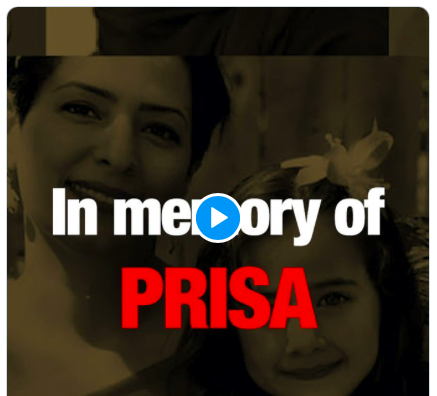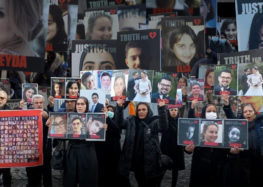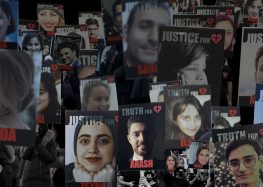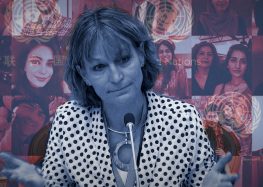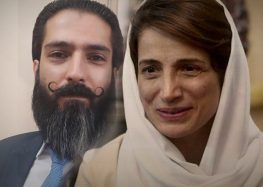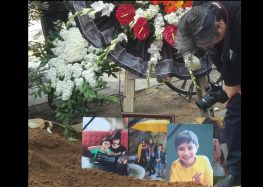Families of Victims in Downed Passenger Plane Refuse Iranian Compensation: “No Justice Without the Truth”
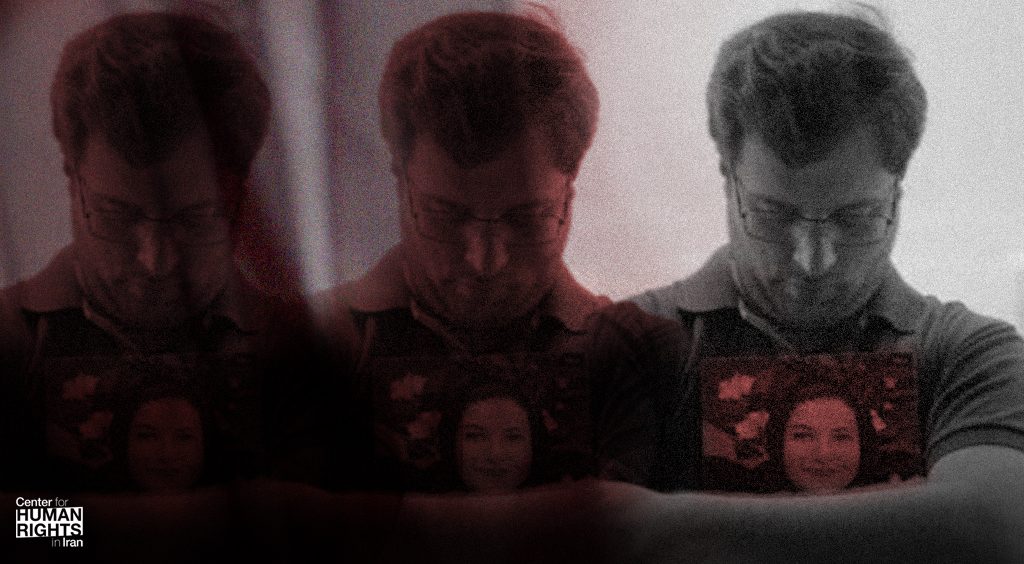 Canadian Government Should Take this Case to the International Court of Justice, Says Justice-Seeking Group
Canadian Government Should Take this Case to the International Court of Justice, Says Justice-Seeking Group
Canadian citizen Javad Soleimani’s world was turned upside down when his wife, Elnaz Nabiyi, died along with 175 other passengers and crew aboard Flight PS752 after it was shot down by Iran’s Islamic Revolutionary Guards Corps on January 8, 2020.
Initially, the government in Iran, where Soleimani and his wife were born, denied responsibility, only to eventually admit that the IRGC had launched missiles at the plane in Iranian airspace.
On November 24, 2021, the Fact-Finding Committee of the Association of Families of Flight PS752 Victims, an organization founded by the victims’ families, issued a fact-finding report which concluded that “high-ranking officials of Iran are responsible for the downing of Flight PS752 and not just a handful of low-ranking IRGC members as per the claims of the government of Iran.”
In the following interview, originally conducted in January 2022 by the Center for Human Rights in Iran (CHRI) in Persian and translated here into English, Soleimani, the group’s representative, describes the families’ “lonely” fight to uncover the truth and bring accountability to the Iranian government.
Iranian President Ebrahim “Raisi has called for payment of compensation because most of the families have turned it down,” Soleimani told CHRI. “For them, the most important issue is discovering the truth and implementing justice.”
CHRI: Why did you call your fact-finding report “The Lonely Fight for Justice”?
Soleimani: We were trying to highlight the inadequate efforts by governments and international organizations. We were not trying to say we lacked public support.
A terrible crime was committed. A country’s military shot down a passenger plane above an international airport but the truth has not been uncovered nor has justice been carried out. Meanwhile, government officials are talking back and forth and delaying the truth from coming out and preventing justice. This is very painful for the families. They cannot have closure until they get to the truth.
This is not just about one crime. If a crime like this is committed and the truth is not revealed and justice is not carried out, we cannot expect to see peace and calm in any part of the world. It would be a danger to all of us.
CHRI: Could you describe the obstacles you’ve faced to seeking justice through international organizations?
Soleimani:This was an unprecedented crime. In other words, the military force of a country downed an aircraft above an international airport while most of the passengers originated from that same country. This was a very unusual crime. International air transportation regulations state that when an aircraft is shot down, or crashes, the incident should be investigated by the country where it happened.
In this case, we see that the Islamic Republic is itself in charge of investigating the crashing of an aircraft shot down by its own missiles. It goes without saying that this makes no sense, but unfortunately, international laws are flawed. At the same time, the reports issued by Iran about this crime have been lacking, as noted by the other government concerned [Canada], as well as the UN special rapporteur and military experts.
Under these circumstances, the only course of action by organizations and governments would have been to challenge the Islamic Republic’s assertions through international air transportation bodies and thereby through pressure on the government in Tehran. If they had acted, the Islamic Republic would have been obliged to respond or face the International Court of Justice.
So far, the Islamic Republic has been issued one ultimatum to respond to questions. I am not optimistic that the Islamic Republic would provide sufficient answers. I only hope that the governments will not delay the process with more talks.
Clearly, the Iranian government has had two years to complete its investigation on the tragedy, but it has failed to do so. We want international action regarding this case as soon as possible so that international legal pressure is put on the Islamic Republic.
CHRI: How far have the families progressed in seeking justice through international organizations?
Soleimani: The most important concern of the families is uncovering the truth, which will pave the way for establishing justice. There can be no justice without the truth. To get there, there are many legal paths, and governments that lost their citizens in this tragedy have an undeniable role to play. Personally, I think it’s unfortunate that the case cannot go forward without the involvement of governments but that’s the way it is.
One legal possibility is to refer the case to the International Court of Justice at the Hague. In other words, the case could be pursued through the International Civil Aviation Organization and then referred to the International Court of Justice. We hope that the Canadian government, despite its shortcomings in this case, will pursue this case through the International Civil Aviation Organization, based in Montreal, and have it referred to the International Court of Justice.
I must say that in order to get to the truth, an international criminal investigation should be carried out but unfortunately Sweden, the UK, and Canada have not taken any action in this regard… Ukraine has been the only country that has pursued a criminal investigation, but it has been alone on this path.
The investigation report published by our association was in fact intended to help the progress of the criminal investigations carried out by Ukraine. If the Islamic Republic is accused of war crimes, it will have serious repercussions. On the other hand, we have tried, without success, to get the Canadian police to open a criminal investigation, and I think the reason is a flack of political will.
We have pursued this case through the International Criminal Court at the Hague, which rules on matters such as war crimes and serious human rights violations. We have asked this court, which was recently established, to start preliminary investigations. The families can directly appeal to this court, but I think it’s necessary for the governments to step in and pursue this matter. Of course, there’s no hope in the Canadian government; only Ukraine has pursued this case. We have had several meetings with Ukraine’s legal officials and the grounds have been laid for cooperation between the Ukrainian government and the International Criminal Court.
In addition, after we published our investigative report, we consulted with our legal team and wrote a letter to the UN Human Rights Council to demand an independent investigation of the tragedy.
The families say existing evidence shows that the Ukrainian plane crash was a crime. Evidence has proven to everyone that the airspace was kept open (after Iran launched missiles in Iraq). That by itself was a crime. When a government keeps the airspace open in war conditions and installs missile defense units next to the international airport, this by itself is a crime. The Islamic Republic often displays deceptive behavior. There is a lot of evidence that indicates the Islamic Republic deliberately shot down the Ukrainian plane. That has been the opinion of the Ontario Superior Court, that based on available evidence, this was a deliberate crime, a terrorist act.
I can offer a lot of evidence that confirms it was a deliberate act. Some of the officials of the Islamic Republic have confirmed this in private statements. In a published audio file, (former Foreign Minister) Javad Zarif stated that it was not impossible that the plane was shot down deliberately and if it was, higher authorities wouldn’t inform him because it wouldn’t be in the country’s national interest.
On the other hand, (former) UN Special Rapporteur on Extra-Judicial Summary or Arbitrary Executions Agnès Callamard has issued a report in which she said the possibility that the Ukrainian plane was intentionally shot down should be seriously investigated.
The minimum demand of the victims’ families is that the UN Human Rights Council order an impartial international investigation. At the same time, all the governments involved in this case, as well as international organizations should use available mechanisms to put pressure on the Islamic Republic. These pressures could be imposed in various ways, such as targeted human rights sanctions, like those ratified by the Canadian Parliament in 2018, which designated the Islamic Revolutionary Guard Corps (IRGC) as a terrorist entity. If the IRGC is declared a terrorist organization maybe the Iranian authorities would be forced to give answers and help uncover the truth about the downing of the Ukrainian plane.
CHRI: What is your opinion of the ruling issued by the Ontario Superior Court?
Soleimani: First of all, the Ontario Superior Court’s ruling is independent of the Canadian government. What we are saying is that the court’s decision, in declaring this a deliberate terrorist act, should become the basis of the Canadian government’s policy and after two years, the authorities should stop being cautious about it.
The court’s ruling was a big victory for the families’ quest for justice. In my opinion, anyone saying anything to the contrary is being wrong and unfair. The ruling was issued in response to a request for compensation by six of the victims’ families. These families have been awarded 107 million Canadian dollars but enforcement is not guaranteed because the Iranian government does not have any assets in Canada. It is going to be a long process to confiscate from assets located in other places and figuring out how to make the payments. Personally, I wish the best for these families but none of the $107 million has reached their hands. Meanwhile, the court does not have the authority to investigate this incident as a war crime. We are pursuing this aspect in international courts.
CHRI: Your investigative report contains many details gathered over a long period of time. Could you describe your fact-finding process and your goals?
Soleimani: Our association was formed less than two months after the crime was committed, and the fact-finding committee began its work at the same time. Given that our most important concern was finding facts, we began to contact experts specializing in air transportation and military matters. Also, the families provided us with a lot of information, much of it based on communications with the victims during their final moments. We also received various forms of information from different sources inside Iran.
In the first 15-16 months, we collected all the information and a large portion of it was handed over to the UN special rapporteur, who used it to publish an extensive report. When Agnès Callamard issued her report, the victims’ families began to feel that their call for justice was, to some extent, being heard. In fact, in her report, Callamard pointed out that governments had not acted enough, and that most of the hard work had been carried on the shoulders of the families. Her report emphasized that it was the families who were pushing the case forward, while the governments, especially Canada, had done little.
Despite the lack of effort by the Canadian government, we continued to cooperate, especially considering that 138 of the victims had some connection to the Canadian government. But ultimately, we concluded that there is no strong will on behalf of the Canadian government to uncover the truth.
We had many internal reports, which we submitted to lawyers to present our case to the Ontario Superior Court, which found the Islamic Republic guilty of deliberately firing missiles. On July 1, [2021}, we decided to put all the evidence and internal reports together and issue a comprehensive and detailed report for the families and the public so that it could be used as a legal tool in the ongoing pursuit of this case through international organizations.
It took us about five months to complete the report based on the information we had, in cooperation with five military and aviation experts as well as five legal experts and some of the families themselves, consisting of 24 individuals altogether. We received a lot of good feedback. The report is the consolidation of all the efforts by the families to shed light on the truth. History and future generations will judge us all and the governments and the international human rights organizations on their role in finding or hiding the truth.
CHRI: Recently, a trial was held in Iran to investigate the plane crash though very few details have been disclosed and the names of defendants have been withheld. Nor has there been any publicized outcome or announcement of further court dates. President Ebrahim Raisi has nonetheless reportedly called for swift compensation. What is your reaction?
Soleimani: The announcement by the Raisi government that compensation should be paid to the families as soon as possible is nothing new. The government of former President Hassan Rouhani made similar statements. After the plane crash, then-Foreign Minister Javad Zarif told the authorities that if the downing was deliberate, he should be told so that he could somehow resolve the crisis. In reality, the Raisi and Rouhani governments have pursued the same policy—a policy of secrecy, to prevent the truth from being revealed and justice being served.
The fact that some families filed a suit in Iran and sought justice does not mean Iran’s judicial system is looking for justice. But some people want to take advantage of even the slightest opportunities to put pressure on Tehran and shame the Islamic Republic. At the same time, there are others who believe that the Iranian judicial system is not qualified to fairly investigate this case… In fact, we [the victims’ families] have no expectation that a court in the Islamic Republic could establish the truth and implement justice.
Over the past two years, the Rouhani government, through the president’s legal adviser, Laya Joneydi, and the Raisi administration, through its Human Rights Office, have made contact with the families to encourage them to accept compensation. Raisi has called for payment of compensation because most of the families have turned it down. For them, the most important issue is discovering the truth and implementing justice. Despite all the complexities and difficulties of this case, it could be said with confidence that compensation would not bring it to a close. The families will continue their pursuit of justice.
CHRI: You have always expressed solidarity with all the struggles for justice in Iran. Why?
Soleimani: I should be clear that seeking justice is not the same as personal revenge. If justice is not carried out, crimes like these will disturb peace and calm for all. That is why we are seeking reforms in international laws to prevent such crimes from recurring.
We should highlight the fact that we cannot investigate the plane crash in a vacuum. The Islamic Republic has a history of committing crimes, which cannot be ignored. There are many examples of human rights violations by the Islamic Republic, which we have listed in our report, from the burning down of Cinema Rex in Abadan in 1978 [by religious extremists] to the crimes committed during the November 2019 [protests].
CHRI: What is your view of the justice-seeking movements in Iran?
Soleimani: I think the various struggles for justice in Iran are largely intertwined. They are the most genuine movements confronting the Islamic Republic’s tyranny. Those participating in these movements are not personally gaining anything. They are continuing their struggles because they have lost loved ones. Look at the mothers who lost children in November 2019, for example. I don’t think there’s anything more genuine than a mother’s quest for justice. Many people are interested in the struggle for justice and offer their support in different ways. But we must also pay attention to the Islamic Republic’s policy of intimidation, which creates fear among many, even those living abroad, even for simple online activities. As long as this fear exists, the Islamic Republic will exist.
Read this article in Persian.

